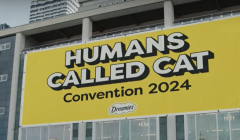
Dreamies investigation proves that the treats are irresistible to cats
The campaign by Adam&EveDDB concludes that the only cats who don’t love the pet treat are human Cats

We ask industry leaders to have their say on the future of creative work

Throughout the pandemic the world was forced to embrace remote working and for all the damages covid brought, remote working opened up new opportunities. It brought the ability to be more international, to create working relationships that may never have been possible and for people to pay more attention to their own lives outside of work. Yet, recent from research from Major Players underlines that there is a disconnect between how employees want to work and the drive to return to the office.
The creative opportunity of hybrid work should extend beyond the argument of whether at home or in office working is better. Productivity is largely individual and creativity can be found in both, perhaps even more in third spaces within culture.
Hybrid working presents a challenge for leaders. It requires trust in talent, an ability to create culture outside of the office walls and it means making a proper, conscious effort to teach and lead. Yet, its ability to help build a more truly diverse, people first workforce is unmatched. With this in mind we asked industry leaders: have the creative industries failed to embrace the true opportunity of hybrid work?

Hybrid working has been both a blessing and a curse. It’s been amazing in terms of opening up opportunities to connect with great talent - from designers and creators, to analysts and editors around the world.
People who’d previously been inaccessible to us are now able to plug into team and client needs. It has also allowed us to better service regions authentically by having talent in local markets without the overheads of opening physical offices in all markets. For an agency whose model revolves around tapping into culture - the local nuances of which change from place to place - this is crucial to us.
However, when it comes to hybrid working we are seeing a need for people to come together. Creative moments are often born from collaboration, from those hallway discussions. Despite the wonders of video calling, breakout rooms and Slack channels, sometimes they’re all a barrier to the question that sparks an idea. Or the brilliant, “no, go on…” moments. Careers are shaped by in-person osmosis too, by being able to physically look over your peers shoulder, by watching and learning.
With physical distance we’re finding this more challenging for our staff and, whilst hybrid working is helping people to manage their work life balance, I am fearful that if we don’t get more people back into the office more often we will see progression and creativity being held back.

I think the question is less about the opportunity of hybrid work and more about what the best way is for creative industries to work to get to the best outcomes.
The answers are currently also different for different agencies (specialism, size etc) and certainly different departments within those agencies.
Creativity is ultimately the name of the game and great ideas will always be the output of great people working collaboratively together. And right now, there is still an efficiency you get from seeing each other in person – their scribbles, their body language etc – that you can’t replicate on a 30-minute Zoom.
But hybrid working has always been a thing. Ideas rarely come sat at our desks and relationships aren’t often formed in meeting rooms. Breakthroughs can come on the commute or on a lunchtime walk, and the science suggests that physical activity helps ideas mingle more freely which enriches creativity.
We have the chance to be much more inclusive and accommodating for talent that needs more flexibility too, but the technology needs to be better to take full advantage of the opportunities it brings. It’s a constant learning curve which by definition means that no one has nailed it, but the answer will always need to be a mix of what’s right for both the organisation and the individual to be successful.

The hybrid work experience is a complex and multifaceted issue, and the creative industry is still working on how to address all of its challenges. Tech has transformed the way we interact with each other and made it easier for creatives to connect on a global scale like never before. However, for fresh and emerging talent, there is still the difficulty of creating an online work experience that mirrors the in-person one. As a creative sonic branding and music agency, the luxury of flexible working can be unappealing for some – musicians often want to be together sharing, developing and presenting ideas. Working from home can also lead to decreased productivity and poor physical and mental well-being. To strike a balance, hybrid working should combine flexibility with creative freedom, allowing individuals to work from home if it suits them while providing clear parameters to separate their personal and professional lives.
Many businesses are playing catch-up with creating a new company culture (the old one can’t just be brought back). Those working in the office can have an advantage over remote workers, naturally creating an inequality. To address this, businesses must invest in the right technology for hybrid work - and we all know how video conferencing can STILL be a crap experience. With effective communication channels to improve inclusion and better accommodate employees working from multiple locations, employees will feel more in tune with each other.

Let’s be honest with each other here. We really haven’t made the most of it have we. When life gives you lemons…. As adpeople we should have made a bloody daiquiri. But instead it just tastes a little sour.
The old-new-normal. The Great Resignation. The nine-day fortnight. 1:4 or 2:3. Everything has changed and hybrid working is here to stay.
As with any change, there are winners and losers. But as marketeers, we’re the masters of creative repositioning. The off-cuts of the brightly coloured wine gums became the lauded black ones. Dress Down Friday existed to see more casual – machine washable clothes – being worn, versus dry-clean only suits. Or De Beers setting the price of an engagement ring diamond at 2 months’ salary – increasing sales from $23m to $2.1bn.
Why haven’t we done the same for hybriding? Let’s not look back and mourn the dust collecting on the pool table. Let’s look forward and embrace the shift away from over-worked to a more calm, creatively focused way. Let’s help show that trust, flexibility and a whole new appreciation for people’s whole selves, can help us be the best leader, colleague, parent, mate, lover. . . we all want to be.

Has the creative industry failed to embrace the opportunity hybrid working presents, no. Has the creative industry nailed how to make the most of hybrid working, not yet.
I won't list the pros and cons of different models on the spectrum between full time remote to full time in office, they've been debated and analysed at length. I will say I believe the answer has to be providing a framework of flexibility, everyone's needs are different, nor are they consistent, and context is everything.
Hybrid working is a chance to pull people’s priorities from ‘me to we’, whilst still enabling them to feel in control of ‘how’. Core hours, the 3/2 model, and work from anywhere are the combination policies we've employed to give our people a framework from which they can make the most of the hybrid working opportunity for them, whilst also recognising that for a creative organisation to thrive, we need people's centre of gravity to be a communal space in which we connect, challenge, spa and participate. Making the space more than somewhere people have calls on laptops is key, enabling connectivity, joy, learning, comradery, a space for, creativity.
Most importantly it's about all parties recognising the needs of others, be that your colleagues, the wider business, or your people and being flexible and responsible enough to make the most of the opportunity presented by hybrid working.

Disappointingly, I am hearing more and more about mandated days in the office from agency pals. With tech developing at a rate of knots and the benefits that hybrid working has had on workforce diversity and work-life balance, it’s now time to end our marriage to the bricks-and-mortar style of working.
Businesses need to unsubscribe from this false notion that a positive work culture cannot coexist alongside hybrid working. There are, of course, occasions that are more appropriate for an office environment, but one of the few upsides of Covid is that it has proven that people are in fact more productive and have improved well-being when they are given the choice to work from home, so as agencies we have to build the necessary structures and channels to allow our people to work seamlessly.
Ultimately, this all comes down to trust. There is nothing wrong with communicating guidelines or expressing a preference in terms of working rhythms, but what is the leadership actually saying if they mandate people’s working patterns? This kind of parent:child behaviour demonstrates a lack of faith in their team’s commitment and that in turn will encourage completely the wrong behaviours.
Surely, with the right focus on effective internal comms and engagement, investment in systems to keep people feeling connected and supported, and the trust of the leadership agencies can maintain their culture whilst creating an environment of positivity, openness and trust.

The short answer is yes.
Just look at the recent headlines around agency burn out. The horrifying stats around poor mental health in our industry. And the difficulties nurturing creative talent around hybrid working.
It’s incredibly difficult to find the right work/life balance for today. But it’s not impossible.
I think we’re all still in the process of re-wiring and re-coupling our agencies. All trying to find the sweet-spot between working-from-home and collaborating face-to-face. It’s never easy to consistently create great work. But there are some things you can do to help yourself and your clients.
Like having Mondays and Fridays as your WFH days: time to hammer TEAMS and get shit done across multiple time zones and locations. Or time to ‘unplug’ and do some deep thinking. Then having (forgive my French ‘TWAT Days’) Tuesdays Wednesdays And Thursdays as your Collaborative Days. Time to come together in the office and bounce off each other.
Tech can bring us closer. But the truth is, behind all great work still is brilliant collaboration. In a room, chewing the fat. Someone says something silly – and before you know it – it’s a bloody seriously good idea.
This spontaneity is really tough to foster on Teams.
So, let’s create a working pattern – a groove that everyone gets behind and can work from. Let’s use tech to bring us closer together from anywhere in the world. And let’s use our office spaces as places to curate and collaborate.
We can’t underestimate the importance of those water cooler moments. And yet we can’t live without tech, even if it does drive us a little crazy.
“You go…. No, sorry, you go… Pete your microphone’s off”.

As with a lot of things, this feels like a topic that’s already been hijacked by a raft of click-driving tech-bro journalists, all keen to tell us how hybrid working will unleash a new wave of creativity.
Of course, there are definite creative benefits to wfh. Time and space to think (if you can detach yourself from your laptop). The democratisation of creativity, especially for those who think best alone/away from distractions.
(Perhaps one opportunity we’re yet to embrace is to find a way to limit those distractions – to reduce the tyranny of Teams, and the energy-sapping inkling that someone in your online presentation is using their second screen to read a Forbes article about hybrid working unleashing a new wave of creativity rather than giving your ideas their full attention.)
It's subjective, of course, but it still feels like there’s still no substitute for in-person collaboration at key moments. That effervescent riffing that fizzes back and forth when we can pick up on each other’s non-verbal signals often leads to better ideas and better versions of those ideas.
For most creatives, the opportunity lies in the balancing of both worlds – something that, at TMW Unlimited, we’ve fostered since lockdowns began to ease. Our core mantra as an agency is to work wherever works best for you; and for creatives, we’ve found that while some alone time merged with Teams and shared docs can be useful, the magic often happens when we’re really together.

The biggest opportunity forced upon us by COVID-19 isn’t hybrid working, the ability to work from anywhere, but flexible working - which encompasses a wider range of work arrangements i.e. different work hours, work days etc. It’s flexible working which will help solve some of the most important issues that we need to address as an industry.
Advertising’s gender pay gap is 81% higher than the UK average. The biggest driver of this is the motherhood penalty, where women can’t afford the increasing cost of childcare so have to leave their career. It's a large reason why only 37.5% of agency C-suite roles are occupied by women.
But simply being able to work remotely, which is what 96% of agencies allow, isn’t going to help solve this - I dread to think how I’d work with my toddler in toe! And equally, it’s not going to help your career either, because the lifeblood of creative industries are heart-quickening, amazing ideas which are usually created from many conversations with different people at different times. These conversations where the magic happens don’t happen on Zoom.
So, for meaningful change agencies need to be far more empathetic and embrace flexible working be-it compressed output 4 day weeks, flexible start and end times, job shares etc. Sadly, I feel where you work has hijacked the conversations around what a good employer looks like, potentially getting in the way of truly meaningful change.

As an industry, I think we need to be as intentional and conscious about how we make hybrid working work as we are about fostering creativity.
And so far, we’ve failed. Just like the tech which so often fails us.
And whilst it's often said that the best creative ideas come from luck and serendipity, at Lucky Generals we are big believers in creating our own luck.
Recreating the serendipitous encounter - of grabbing a coffee or bumping into someone in the kitchen - is difficult to do virtually without it becoming process heavy or transactional; both of which tend to be big killers of said creativity.
A pocket dial or WhatsApp banter still feels like the closest we've got. More miss than hit.
At Lucky Generals, we’ve been successful in intentionally embracing hybrid working as 'all-in / all-out TWATs' - all of us are in the office together mid-week, and we’re elsewhere on Monday and Friday.
Very early on we saw the benefits for our physical and mental health; for parents doing school and nursery pick-ups, for the now many pet lovers, for travelling to see friends and relatives, for catering to introverts as well as extroverts.
We’re now very intentional about dividing our time between undisturbed thinking when we’re remote and alone, and collaboration when we’re in person and together.

Whilst terrible for many things, the one brilliant revolution that Covid created was that of a truly flexible approach to work. We had no choice but to adapt - technologically, emotionally and physically. It’s not just a nice-to-have, it’s become a crucial part of how we should now operate. Dark Horses is perhaps one of the few agencies that I’m aware of that doesn’t mandate days in the office. We feel that quality isn’t dependent on bums-on-seats. We have people who want to commit to nursery drop-off and pick-ups, we have people who live just far enough away to make even two days a week a financial and time burden. If we want to support the ambition for genuine gender parity, this kind of attitude is vital. It’s very simply built on trust, alongside proof of delivery. We encourage occasional (even regular) office visits, as it's obviously good for morale, for humanity, for relationship-building and for learning & development. And we organize opportunities for people to engage in person - visiting production companies, internal training, agency meetings. But attendance in person isn’t obligatory. Each to their own seems to have worked well for us. I’m thrilled we haven’t gone back to the ‘old’ way of working. On a personal level, I love being with the team, but I also love not having to put a wash on at 8pm whilst also juggling food for the family. I hope this new generation doesn’t experience the residual (and nonsensical) guilt of my 90s work upbringing. If we want to keep people, we have to help them have balanced lives, providing supportive tools, but letting them be the judges of how they manage it for themselves.
Looks like you need to create a Creativebrief account to perform this action.
Create account Sign inLooks like you need to create a Creativebrief account to perform this action.
Create account Sign in